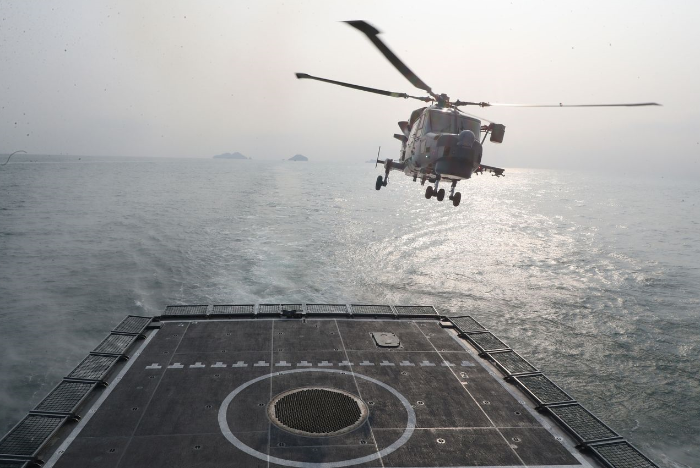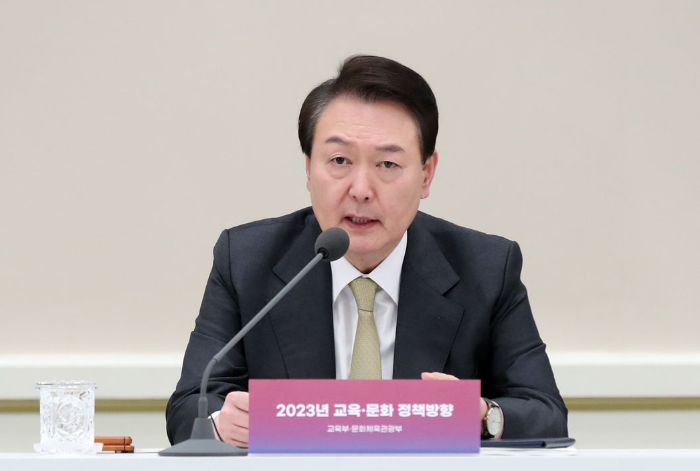South Korea Revives Nuclear Debate as Tensions With the North Rise
Seoul urges Washington to let it play more active role in nuclear-weapons management
By The Wall Street Journal Jan 16, 2023 (Gmt+09:00)
Samsung shifts to emergency mode with 6-day work week for executives


Alibaba eyes 1st investment in Korean e-commerce platform


Blackstone signs over $1 bn deal with MBK for 1st exit in Korea


NPS loses $1.2 bn in local stocks in Q1 on weak battery shares


MBK eyes stake in Korean software developer Tmaxsoft



SEOULŌĆöRising tensions on the Korean Peninsula and PyongyangŌĆÖs spree of weapons tests are fueling a debate in South Korea over the deployment and development of nuclear weapons as a deterrent.
South Korean President Yoon Suk-yeol and some ruling-party lawmakers are pushing for Washington to allow Seoul to be more involved in the management of nuclear weapons, including planning and joint exercises. Some lawmakers have even called for the U.S. to deploy tactical nuclear weapons on the Korean Peninsula again or for South Korea to develop its own nuclear weapons.
South Korea is protected under what is known as the nuclear umbrellaŌĆöan agreement that says the U.S. will use its nuclear weapons to defend its ally. But Mr. Yoon has said that is no longer sufficient to reassure the South Korean public, in the face of an increasingly aggressive and militarily capable North Korea.
Washington has rejected calls to redeploy nuclear weapons on the Korean Peninsula, while reaffirming that the U.S.is committed to defending South Korea. Opponents to South Korea developing its own nuclear weapons say it would violate the Nonproliferation Treaty and create a greater risk for nuclear war.
Experts on North Korea say any further nuclear buildup could inflame tensions with Pyongyang and undermine WashingtonŌĆÖs goal of completely denuclearizing the Korean Peninsula.
ŌĆ£Adding new weapons systems to the Korean Peninsula destabilizes the situation and gives North Korea more reason to accelerate its nuclear program,ŌĆØ said Ken Gause, an expert on North Korean leadership at CNA, a nonprofit research organization.
On Monday, Mr. Yoon told a South Korean newspaper that Seoul and Washington were discussing conducting joint exercises using U.S. nuclear assets.
President Biden denied that the allies were holding talks on joint nuclear drills. On Tuesday, White House press secretary Karine Jean-Pierre said Messrs. Biden and Yoon had instructed their governments to enhance joint defense readiness based on U.S. extended deterrence in response to North KoreaŌĆÖs threat, adding that the two nations werenŌĆÖt discussing joint nuclear exercises because South Korea was a non-nuclear-weapons state.
In 2017, when North Korea conducted an intercontinental ballistic missile test and a nuclear test, the conservative party led a nationwide campaign to consolidate support for redeployment.
Support for South Korea to develop its own nuclear weapons has similarly risen at times of increased tension between the two countries. In 2018, when North Korean leader Kim Jong Un engaged in summits with Mr. YoonŌĆÖs predecessor, Moon Jae-in, public support in South Korea for the acquisition and development of nuclear weapons stood at about 55%, according to polls by the Chicago Council on Global Affairs.
By 2022, support had risen to 70%, with negotiations stalled and North KoreaŌĆÖs weapons development becoming more menacing. ŌĆ£South Koreans know they are living in a very unforgiving region so perhaps taking security into their own hands is seen as a logical next step,ŌĆØ said Karl Friedhoff, a fellow in public opinion and Asia policy at the Chicago Council on Global Affairs.
Tensions have risen rapidly on the Korean Peninsula, as North Korea has accelerated its weapons testing and Mr. Yoon has taken a tougher line on Pyongyang than Mr. Moon. Pyongyang conducted a record number of missile launches last year, including an intercontinental ballistic missile and a submarine launched missile.
Officials in Washington and Seoul have said the country appears to be preparing for another nuclear test. The North Korean leader during a year-end party meeting pledged to exponentially increase his nuclear arsenal.
Last week, North Korea flew five drones over South Korean territory.
On Thursday, South KoreaŌĆÖs spy agency told lawmakers it couldnŌĆÖt rule out the possibility that one of the drones had filmed the presidential office. A military official said a North Korean drone briefly entered the northern edge of the no-fly zone over the presidential office but it didnŌĆÖt come close to security facilities.

Mr. Yoon said this week that he would consider suspending a 2018 pact between the countries that bars hostile acts in border areas if North Korea violated South Korean airspace again.
Pyongyang has violated the agreement 17 times, including by firing a missile close to South KoreaŌĆÖs territorial waters and firing artillery shells near the border, according to the presidential office.
Mr. Yoon has also pursued the strengthening of conventional defense and missile capabilities by acquiring submarine-launched ballistic missile capabilities and developing homegrown missile-interception systems.
But those advocating for the redeployment of nuclear weapons say that conventional capabilities are insufficient to prevent a war on the Korean Peninsula, and that the U.S. nuclear umbrella canŌĆÖt be fully trusted.
ŌĆ£We canŌĆÖt counter nuclear weapons with conventional weaponry, so there is no way but to acquire nuclear capabilities ourselves,ŌĆØ ruling-party lawmaker Kim Gi-hyeon, who has called for South Korea to develop its own nuclear weapons, said in October as he was running for the partyŌĆÖs chairmanship.
Some South Korean lawmakers have called for the U.S. to deploy nuclear weapons on the Korean Peninsula, possibly by permanently stationing nuclear-armed submarines or aircraft carriers in nearby waters.
Some have suggested a North Atlantic Treaty Organization-style arrangement in which South Koreans would be trained to deliver U.S. nuclear weapons in conflict. Washington has rejected those calls.
Opposition party lawmakers, who generally support dialogue with North Korea, have said bringing nuclear weapons back to the Korean Peninsula would undermine the countryŌĆÖs longstanding support for nuclear disarmament.
The country would lose legitimacy in its push for the denuclearization of North Korea, said Kim Byung-joo, a retired army general and lawmaker of the Democratic Party.
The U.S. and South Korea have faced limitations in countering North KoreaŌĆÖs threat other than strengthening deterrence and preparing for future negotiations, said former South Korean nuclear envoy Wi Sung-lac, especially as Russia and China vetoed additional United Nations sanctions following ICBMtests and dozens of short-range ballistic missile launches last year.
ŌĆ£The Yoon administration may pursue more involvement in deploying U.S. nuclear assets, but China and Russia will perceive greater U.S. presence on the Korean Peninsula as a significant threat, making it even more difficult to seek their support on resolving North KoreaŌĆÖs nuclear issue,ŌĆØ Mr. Wi said.
Despite the risks of a nuclear buildup on the Korean Peninsula, some members of the public say they are more open to South Korea developing its own nuclear weapons. Lee Han-sol, a 26-year-old college student, says he used to give little thought to South Korea acquiring its own weapons, when he saw the leaders of the two Koreas holding summits and agreeing to peaceful relations in 2018.
ŌĆ£My thoughts have changed a bit since finishing military service, where weŌĆÖre taught to think of North Korea as the enemy, and the constant missile tests and talk of nuclear testing now have me thinking South Korea needs a better way to defend itself. Nuclear weapons could be one option,ŌĆØ Mr. Lee said.
Write to Dasl Yoon at dasl.yoon@wsj.com
-
 Fiber & TextileNorth Face supplier Youngone to bet on global outdoor startups
Fiber & TextileNorth Face supplier Youngone to bet on global outdoor startupsJul 14, 2022 (Gmt+09:00)
2 Min read -
 North KoreaNorth Korea dismisses South KoreaŌĆÖs move to improve ties as ŌĆśabsurd dreamŌĆÖ
North KoreaNorth Korea dismisses South KoreaŌĆÖs move to improve ties as ŌĆśabsurd dreamŌĆÖAug 23, 2022 (Gmt+09:00)
4 Min read -
 North KoreaNorth Korea missile tests drawing tougher response from US, South Korea
North KoreaNorth Korea missile tests drawing tougher response from US, South KoreaJun 13, 2022 (Gmt+09:00)
4 Min read -
 North KoreaNorth Korea fires three missiles after Biden ends Asia trip
North KoreaNorth Korea fires three missiles after Biden ends Asia tripMay 26, 2022 (Gmt+09:00)
3 Min read -

-
 North KoreaNorth Korea can make more uranium for nuclear bombs than previously thought
North KoreaNorth Korea can make more uranium for nuclear bombs than previously thoughtNov 04, 2021 (Gmt+09:00)
5 Min read -
 North KoreaNorth Korea puts on show of missile might as Kim Jong-un snubs US
North KoreaNorth Korea puts on show of missile might as Kim Jong-un snubs USOct 13, 2021 (Gmt+09:00)
2 Min read -
 North Korea fires two ballistic missiles off its East Coast
North Korea fires two ballistic missiles off its East CoastSep 15, 2021 (Gmt+09:00)
3 Min read


